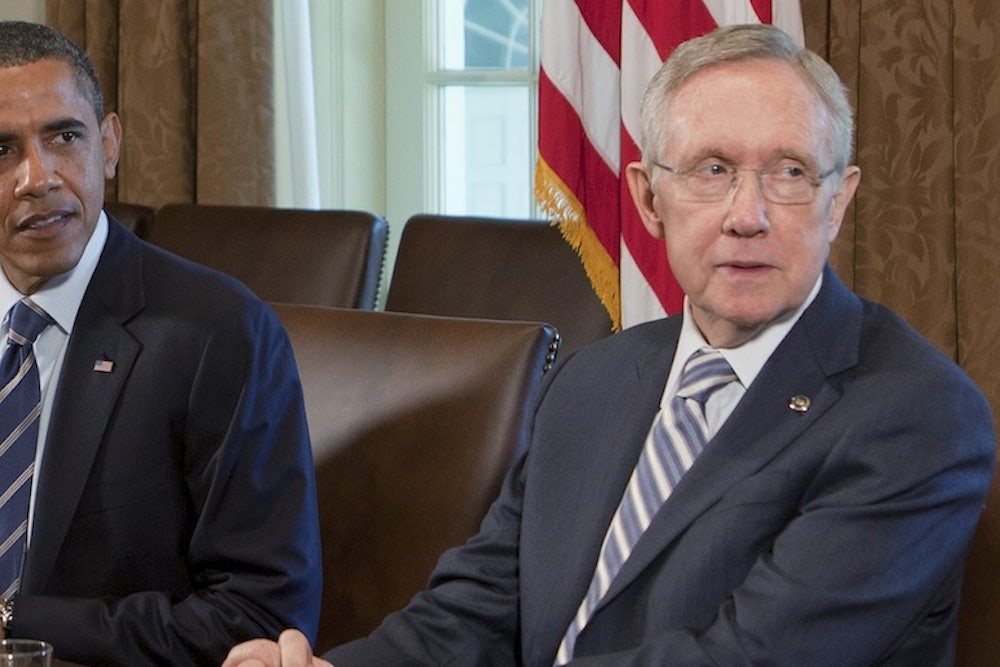Did the White House just open the door to some kind of short-term increase in the debt limit, perhaps to allow broader negotiations over fiscal priorities? Several media outlets are reporting as much. A senior administration official says that’s incorrect. I’m not sure who’s right or how much it actually matters. But, just in case, here’s the story.
During a Monday morning forum hosted by Politico, Gene Sperling, the president’s chief economic advisor, spoke about the debt limit. The Treasury reached that limit some time ago and, since then, it has been using “extraordinary measures” to keep paying the country’s bills. But officials and independent analysts say the Treasury will run out of options sometime in October, or by the beginning of November at the very latest. At that point, the government won’t be able to borrow the cash it needs to pay what it owes to creditors, suppliers, and those receiving government benefits.
Obama has said that he expects Congress to raise the limit, as it has always done in the past, because to do otherwise would wreak havoc on the economy. Obama has also said he won’t negotiate on the terms of that increase, as he did in 2011. In other words, it’s up to Congress to take care of the limit—without attaching conditions. What Obama hasn’t specified is how much borrowing authority Congress should give the Treasury. Senate Majority Leader Harry Reid has said he wants an increase big enough so that Treasury won’t need another renewal of authority until after the 2014 elections—in other words, an increase good enough to last at least a year.
Does the White House agree? In response to a question along those lines, Sperling said “It is the responsibility of Congress to decide how long and how often they want to vote on doing that, the important thing is that they not threaten default and that they not put our country on the brink of that.” Later he added, “Longer is better for economic certainty and jobs, but it is ultimately up to them.”
Both Politico's Kevin Cirilli and the Washington Post’s Zachary Goldfarb took this to mean that Obama was interested in a short-term deal. Here's how Cirilli wrote it: "The Obama administration would be open to a bill that boosts the debt ceiling for a few weeks, a top White House official said on Monday, a move that could buy time for congressional Republicans and the White House to find a way to end the current series of fiscal fights. Goldfarb reported that “President Obama would accept a short-term increase in the federal borrowing cap, rather than one lasting a year or more, a senior White House official said Monday.”
A senior administration official, speaking on condition of anonymity, offered a different explanation. This official told me Sperling was not trying to say anything about the size and duration of an increase, except to observe that a longer extension was better for the economy. As this official explained it, Sperling was merely reiterating the president’s position: That he expects Congress to increase the debt limit, without conditions or demands, and that he’s simply not going to get sucked into a debate over how to do it—and that includes questions of size and duration.
I have no idea whose interpretation is correct. Maybe both are. Goldfarb notes, correctly, that in 2011 the White House insisted any increase last at least through the next election—basically, the demand Reid is making now. But during that episode, Obama was engaged in negotiations over the debt ceiling. This time, he isn't. (If more information becomes available later, I'll update this item accordingly.)
Either way, the very existence of this controversy is one more reminder of how disruptive the debt ceiling debate can be. Having regular debates in which one party can extort the other is no way to run a democracy—because, among other things, it means the political (and, at some point, the financial) world depends on the parsing of every little statement for nuance, inflection, and hidden meanings. The best possible outcome of this whole sad chapter would be to enact some kind of permanent reform, in which the Treasury’s ability to borrow money—and pay bills from the past—didn’t depend on congressional assent.
So far, nobody seems to be talking about that seriously. Maybe that should change.
